Francis X. Morrissey Jr.: A Witness to History
How his life brought him in contact with the Kennedy family, Pakistani General Musa, Indian Prime Minister Nehru, American Communist Party founder/AFL-CIO labor leader / CIA informant Jay Lovestone, and many social, cultural and political leaders at key moments in history |
Throughout his life, Francis has met many renowned figures and has witnessed some of the most important events of the past seventy years.
General George Patton
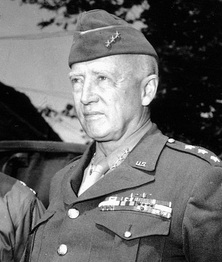
During the time when Francis's father worked for Massachusetts Governor Maurice Tobin, General George Patton had recommended him to Joseph Kennedy, who then hired FXM Sr. to work on the 1946 Congressional campaign of his son John F. Kennedy.
“After World War II, my father was working with the Salvation Army in New England on the property of Beatrice Banning Ayer, General George Patton's wife. Joseph Kennedy was there and said to General Patton, ‘I need someone to help get my son, Jack, into politics.' And so, Patton said, ‘Well, that kid there, Frankie Morrissey from Charlestown, he can do it.' So, that's how it started."
“After World War II, my father was working with the Salvation Army in New England on the property of Beatrice Banning Ayer, General George Patton's wife. Joseph Kennedy was there and said to General Patton, ‘I need someone to help get my son, Jack, into politics.' And so, Patton said, ‘Well, that kid there, Frankie Morrissey from Charlestown, he can do it.' So, that's how it started."
Joseph P. Kennedy Sr.
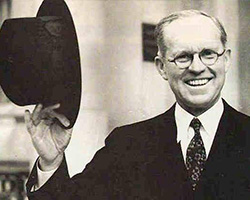
When Francis was about eight years old, Joseph P. Kennedy Sr. hired FXM Sr. to work on the 1946 Congressional campaign of his son John F. Kennedy. FXM Sr. helped run JFK's Boston Congressional office and worked on his 1952 winning Senate campaign. FXM Sr. was appointed Municipal Court Judge in Boston in 1958. The Kennedys regarded FXM Sr. as part of the Kennedy family.
Because of his father's close relationship with the Kennedys, young Francis had a front row seat at the evolution of the Kennedys as leaders.
“My father and mother often got calls from Joseph Kennedy and John [JFK]. If they were downstairs, I'd pick up the upstairs phone and listen, trying carefully not to make any noise. I remember hearing them mention the name 'Gloria Swanson.' "
“My father connected Joseph P. Kennedy with Cardinal Cushing, who told Joseph that if he wanted his son to become President, he had to bring his daughter Rosemary out of the institution and recognize her as part of the family, despite the secretive nature of her lobotomy. While they did not bring Rosemary into the public eye, Cardinal Cushing and my father created a school called Saint Coletta School for Exceptional Children in the fifties. My father also worked very hard on having John Kennedy recognize the importance of connecting with the common man."
Because of his father's close relationship with the Kennedys, young Francis had a front row seat at the evolution of the Kennedys as leaders.
“My father and mother often got calls from Joseph Kennedy and John [JFK]. If they were downstairs, I'd pick up the upstairs phone and listen, trying carefully not to make any noise. I remember hearing them mention the name 'Gloria Swanson.' "
“My father connected Joseph P. Kennedy with Cardinal Cushing, who told Joseph that if he wanted his son to become President, he had to bring his daughter Rosemary out of the institution and recognize her as part of the family, despite the secretive nature of her lobotomy. While they did not bring Rosemary into the public eye, Cardinal Cushing and my father created a school called Saint Coletta School for Exceptional Children in the fifties. My father also worked very hard on having John Kennedy recognize the importance of connecting with the common man."
John Fitzgerald “Jack” Kennedy (“JFK”)
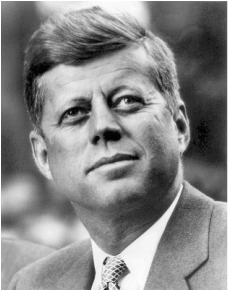
When JFK was running for Congress in the early fifties, Francis often saw him at his family's home. “When Jack came to our house, I was riveted listening to his stories about saving his men on PT-109, their Motor Torpedo Boat in the Solomon Islands. I remember thinking, 'This man is afraid of nothing. A real hero.' "
“Jack Kennedy was the godfather of my brother Joseph Patrick, whom my parents had named after Kennedy's father.
As a child, Francis would listen to his father train Jack how to be an effective speaker. “My dad quickly discovered that Jack could not deliver a speech. So, he brought him down to my grandfather's union hall and would fire questions at him. Jack did well with that approach because he was a smart ass and quick on the spot. That's when he devised the Kennedy style of matching a fact with a statistic because he believed numbers confused people."
“One day while my dad and Jack were campaigning in Charlestown, Jack was wearing a top hat (as all men wore at that time). My dad told him, ‘Jack, take your hat off.' Jack said, ‘Why, Frankie?' My dad said ‘Because you look like Dilly Hourihan - he's right over there.' Across the street was a big, fat Irish man with a round, red face and a little hat sitting on top of his head. Jack took off his hat and never wore one again. Do you remember when Jack gave his Inaugural speech? At that moment, with that speech, he destroyed the hat industry in the United States."
Francis's father had always committed himself to civil rights. He made sure to carry that with him during his time working with Jack. In 1932, following the kidnapping of Charles Lindbergh's son, kidnapping was made a federal offense. However, lynching was not a federal crime until 1964. Social injustices like this infuriated Francis's father.
“I grew up in an unprejudiced home where my parents did not permit racism of any kind. We always had people of every nationality, of every background visiting," said Francis. “My dad encouraged Jack to speak out about the pitfalls of racism. Jack was a rationalist; and racism is not rational, as my father pointed out. So, Jack fought for what was rational."
After Martin Luther King, Jr.'s famous ‘I Have a Dream' speech at the March on Washington, Jack invited King to the White House. Upon hearing this, J. Edgar Hoover sent a prompt message to the White House that King was ‘the most dangerous Negro in America.' Shortly later, King was arrested for a traffic violation and sentenced to six months of hard labor. King's wife, Coretta, feared that adversaries would kill her husband in jail. So Jack, Sargent Shriver, Robert Kennedy, and Francis's father worked on getting King released.
Francis remembers overhearing a particular conversation in his family's home. “Jack was sitting in a red chair in our living room while our fathers talked with him about the injuries he had suffered during World War II. Jack needed a spinal operation. Joseph said to Jack, ‘You can be like Roosevelt. No one knew he was paralyzed.' And Jack said, ‘No, I don't want to be President if I can't stand and walk.'"
One conversation in particular between Francis's father and Jack has stayed with him for most of his life. “My dad and Jack would go to wakes because back then, wakes were part of the fabric of the Boston Irish. Jack would look down at the body in the funeral home and say, ‘Better you than me.' He told my dad, ‘Frank, make sure I have a closed casket.'"
Years later, after Jack had been killed and his body had arrived in D.C. from Texas, Francis's father told Jackie about Jack's wishes. His funeral had a closed casket.
“Jack Kennedy was the godfather of my brother Joseph Patrick, whom my parents had named after Kennedy's father.
As a child, Francis would listen to his father train Jack how to be an effective speaker. “My dad quickly discovered that Jack could not deliver a speech. So, he brought him down to my grandfather's union hall and would fire questions at him. Jack did well with that approach because he was a smart ass and quick on the spot. That's when he devised the Kennedy style of matching a fact with a statistic because he believed numbers confused people."
“One day while my dad and Jack were campaigning in Charlestown, Jack was wearing a top hat (as all men wore at that time). My dad told him, ‘Jack, take your hat off.' Jack said, ‘Why, Frankie?' My dad said ‘Because you look like Dilly Hourihan - he's right over there.' Across the street was a big, fat Irish man with a round, red face and a little hat sitting on top of his head. Jack took off his hat and never wore one again. Do you remember when Jack gave his Inaugural speech? At that moment, with that speech, he destroyed the hat industry in the United States."
Francis's father had always committed himself to civil rights. He made sure to carry that with him during his time working with Jack. In 1932, following the kidnapping of Charles Lindbergh's son, kidnapping was made a federal offense. However, lynching was not a federal crime until 1964. Social injustices like this infuriated Francis's father.
“I grew up in an unprejudiced home where my parents did not permit racism of any kind. We always had people of every nationality, of every background visiting," said Francis. “My dad encouraged Jack to speak out about the pitfalls of racism. Jack was a rationalist; and racism is not rational, as my father pointed out. So, Jack fought for what was rational."
After Martin Luther King, Jr.'s famous ‘I Have a Dream' speech at the March on Washington, Jack invited King to the White House. Upon hearing this, J. Edgar Hoover sent a prompt message to the White House that King was ‘the most dangerous Negro in America.' Shortly later, King was arrested for a traffic violation and sentenced to six months of hard labor. King's wife, Coretta, feared that adversaries would kill her husband in jail. So Jack, Sargent Shriver, Robert Kennedy, and Francis's father worked on getting King released.
Francis remembers overhearing a particular conversation in his family's home. “Jack was sitting in a red chair in our living room while our fathers talked with him about the injuries he had suffered during World War II. Jack needed a spinal operation. Joseph said to Jack, ‘You can be like Roosevelt. No one knew he was paralyzed.' And Jack said, ‘No, I don't want to be President if I can't stand and walk.'"
One conversation in particular between Francis's father and Jack has stayed with him for most of his life. “My dad and Jack would go to wakes because back then, wakes were part of the fabric of the Boston Irish. Jack would look down at the body in the funeral home and say, ‘Better you than me.' He told my dad, ‘Frank, make sure I have a closed casket.'"
Years later, after Jack had been killed and his body had arrived in D.C. from Texas, Francis's father told Jackie about Jack's wishes. His funeral had a closed casket.
JFK's Funeral
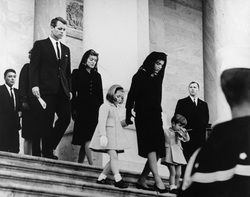
In November 1963, Francis was 21 years old and a junior at Harvard. He attended the funeral of JFK as the son of his father – a long-time Kennedy secretary and confidant. “My mother took me to three or four places in Washington where we could rent a mourning suit because Mrs. Kennedy had decided on a formal funeral. As I was renting a suit in one of the shops with Secretary of Defense Robert McNamara, the ambassador from Yugoslavia came in. He held a cigarette in a fancy holder and said: ‘Oh by the way, did you hear? Oswald was shot.' People said, ‘Oh my God! No! Where?' And the ambassador said, 'In the basement of the Dallas police station, of course.' He left and we heard the bell on the door jingle, and we all just stared at each other."
Francis detected a fear in Washington that more people would be killed. “For that reason, my father and Sargent Shriver remained in the White House that day, guarded by Marines, as per Mrs. Kennedy's instructions. Many people were hiding."
On the day of the funeral, Francis escorted Teddy Kennedy's wife Joan from the site of the public service at the U.S. Capitol to the funeral at St. Matthew's Church. “I took Joan Kennedy down the steps of the Congress Building, into the limousine to a small Catholic Church. I was with my younger brother Joseph Patrick, President Kennedy's godson."
“I remember seeing Haile Selassie, the Emperor of Ethiopia, and President Charles de Gaulle walking down the aisle. Every step de Gaulle took, he pushed Haile Selassie's sword into the pews. The sword made so much noise 'clink-clink-clink-clink.' It was hysterical and added a much-needed lightness to the seriousness of the funeral."
Francis detected a fear in Washington that more people would be killed. “For that reason, my father and Sargent Shriver remained in the White House that day, guarded by Marines, as per Mrs. Kennedy's instructions. Many people were hiding."
On the day of the funeral, Francis escorted Teddy Kennedy's wife Joan from the site of the public service at the U.S. Capitol to the funeral at St. Matthew's Church. “I took Joan Kennedy down the steps of the Congress Building, into the limousine to a small Catholic Church. I was with my younger brother Joseph Patrick, President Kennedy's godson."
“I remember seeing Haile Selassie, the Emperor of Ethiopia, and President Charles de Gaulle walking down the aisle. Every step de Gaulle took, he pushed Haile Selassie's sword into the pews. The sword made so much noise 'clink-clink-clink-clink.' It was hysterical and added a much-needed lightness to the seriousness of the funeral."
Pakistani General Muhammad Musa Khan
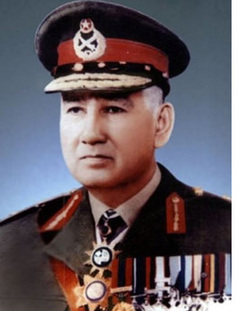
Near his freshman year at Harvard, Francis's friend and classmate, Ashraf Adamjee, asked Francis to be his best man in his wedding in Dhaka, East Pakistan. Francis traveled to Northwest Pakistan with another Harvard classmate, Hassan Musa, who was the son of General Muhammad Musa Khan, the Commander-in-Chief of the Pakistan Army serving under President Ayub Khan. Francis's journey to Pakistan and India made an indelible impact on his character and his outlook on life.
Impressed by Francis and his father's relationship with JFK, General Musa welcomed him by arranging a visit to the modest villages of his Batang soldiers. While in Peshawar, Francis was eating lunch with General Musa when the General was called away to speak with Soviet emissaries. Upon his return, General Musa said to Francis, “Tell your President [JFK] that I told the Russians to go to hell.” Later, Francis learned that the Russians were urging Musa to close the U.S. military base in Rawalpindi, a key Cold War asset during the Cuban Missile Crisis.
The debate whether to close the base had become a sensitive moment in international relations. Francis Gary Powers had just crashed in the Soviet Union, and the Cuban Missile Crisis was erupting. Rawalpindi was an important American outpost. Eisenhower told Kennedy at the beginning of his presidency, “Whatever you do, keep the base in Rawalpindi."
Francis does not believe they kept the base open because of what Musa had told him, but Francis did make sure to relay the message to President Kennedy. “I think when Kennedy told Khrushchev to withdraw from Cuba, Khrushchev knew we had a base in Rawalpindi five minutes away from Moscow."
At age 19, Francis became an unofficial emissary. As an emissary, General Musa took him to all of the installations, the first general assembly of Pakistan. “His men took me to many small villages. I liked General Musa very much. As we rode in his private railroad car, he brought together musicians from different parts of the country and invited them to play for us. After his son had fallen asleep, General Musa said to me, ‘Which instrument do you like the best?' I said the flute because I knew his father had been a shepherd. So, he had a flutist play for us. I said, ‘General, what was the moment, what was the risk you took that paved the way for your career?' And he said, ‘I was a sergeant in the transfer of Hindus and Muslims during the Partition. I noticed that the trains coming into Pakistan were empty. So, I decided to trade one train of Hindus for one train of Muslims.' That effort helped Musa jump ranks because he was the only general that hadn't gone to Sandhurst. In fact, they were massacring all the Muslims in India at that time. So, that was his existential moment."
Francis found General Musa to be rarely personal, yet they developed a friendly relationship. “When I first arrived there, a baby hung on the wall in a papoose. So, I said, ‘General, that's a baby.' He said ‘Yes.' I said, 'How long do you keep him there?' He said, ‘About two years. It teaches them discipline.'"
During his trip, Francis stayed in the luxurious home of the Maharani of Jaipur at the recommendation of General Musa. While wandering the poorer sections of the city, Francis noticed a woman hunched toward the ground, sobbing as she desperately pulled food from a dog’s mouth. “That image stayed with me for the rest of my life,” said Francis, who noted that memory as the spark that ignited his lifelong passion for helping the poor.
Francis also met with Indian Prime Minister Jawaharlal Nehru, a meeting arranged by a sympathetic Sikh aide to the famed leader. When Francis asked Nehru, “What does a privileged man do with the experience of India?” the Prime Minister answered: “That’s very simple. You love us. If you love us as brothers and sisters, you help us. And if you don’t love us as brothers and sisters, we don’t want your help.”
After returning to the U.S., Francis met with some intelligence officials in Cambridge to recount his meetings with General Musa and Nehru and his experiences in West Pakistan near the frontier with Afghanistan at the Khyber Pass.
Impressed by Francis and his father's relationship with JFK, General Musa welcomed him by arranging a visit to the modest villages of his Batang soldiers. While in Peshawar, Francis was eating lunch with General Musa when the General was called away to speak with Soviet emissaries. Upon his return, General Musa said to Francis, “Tell your President [JFK] that I told the Russians to go to hell.” Later, Francis learned that the Russians were urging Musa to close the U.S. military base in Rawalpindi, a key Cold War asset during the Cuban Missile Crisis.
The debate whether to close the base had become a sensitive moment in international relations. Francis Gary Powers had just crashed in the Soviet Union, and the Cuban Missile Crisis was erupting. Rawalpindi was an important American outpost. Eisenhower told Kennedy at the beginning of his presidency, “Whatever you do, keep the base in Rawalpindi."
Francis does not believe they kept the base open because of what Musa had told him, but Francis did make sure to relay the message to President Kennedy. “I think when Kennedy told Khrushchev to withdraw from Cuba, Khrushchev knew we had a base in Rawalpindi five minutes away from Moscow."
At age 19, Francis became an unofficial emissary. As an emissary, General Musa took him to all of the installations, the first general assembly of Pakistan. “His men took me to many small villages. I liked General Musa very much. As we rode in his private railroad car, he brought together musicians from different parts of the country and invited them to play for us. After his son had fallen asleep, General Musa said to me, ‘Which instrument do you like the best?' I said the flute because I knew his father had been a shepherd. So, he had a flutist play for us. I said, ‘General, what was the moment, what was the risk you took that paved the way for your career?' And he said, ‘I was a sergeant in the transfer of Hindus and Muslims during the Partition. I noticed that the trains coming into Pakistan were empty. So, I decided to trade one train of Hindus for one train of Muslims.' That effort helped Musa jump ranks because he was the only general that hadn't gone to Sandhurst. In fact, they were massacring all the Muslims in India at that time. So, that was his existential moment."
Francis found General Musa to be rarely personal, yet they developed a friendly relationship. “When I first arrived there, a baby hung on the wall in a papoose. So, I said, ‘General, that's a baby.' He said ‘Yes.' I said, 'How long do you keep him there?' He said, ‘About two years. It teaches them discipline.'"
During his trip, Francis stayed in the luxurious home of the Maharani of Jaipur at the recommendation of General Musa. While wandering the poorer sections of the city, Francis noticed a woman hunched toward the ground, sobbing as she desperately pulled food from a dog’s mouth. “That image stayed with me for the rest of my life,” said Francis, who noted that memory as the spark that ignited his lifelong passion for helping the poor.
Francis also met with Indian Prime Minister Jawaharlal Nehru, a meeting arranged by a sympathetic Sikh aide to the famed leader. When Francis asked Nehru, “What does a privileged man do with the experience of India?” the Prime Minister answered: “That’s very simple. You love us. If you love us as brothers and sisters, you help us. And if you don’t love us as brothers and sisters, we don’t want your help.”
After returning to the U.S., Francis met with some intelligence officials in Cambridge to recount his meetings with General Musa and Nehru and his experiences in West Pakistan near the frontier with Afghanistan at the Khyber Pass.
Edward Moore “Ted" Kennedy
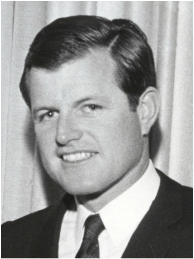
Francis was with Ted Kennedy at his home on Ted's thirtieth birthday.
“On that day, Jack called him from the White House and said, ‘Ted, I give you my seat in the Senate until you take my seat here in the White House. Happy birthday.'"
“He hung up, and my dad said, ‘Teddy if you want to be President, you can't drive.'"
“Teddy said, ‘How will I get around?'"
“My father said, ‘You get a chauffeur.'"
“On that day, Jack called him from the White House and said, ‘Ted, I give you my seat in the Senate until you take my seat here in the White House. Happy birthday.'"
“He hung up, and my dad said, ‘Teddy if you want to be President, you can't drive.'"
“Teddy said, ‘How will I get around?'"
“My father said, ‘You get a chauffeur.'"
Lord Mountbatten's Bedroom
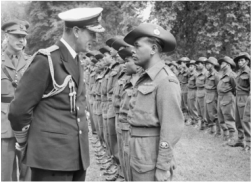
The Army drafted Francis in 1966. In the interview, he said, “I'll go. But I won't pick up a gun. I wouldn't want to kill somebody."
Francis and his interviewer talked about Northern Pakistan and the cities Francis had visited there. Francis said, “I slept in Lord Mountbatten's bed." Lord Mountbatten was the last Viceroy of the British Indian Empire and the first Governor-General of independent India.
The interviewer said, “Describe the bedroom." Francis replied, “Well, my bed was a four-post, black English bed with columns. There were four tigers on the walls and a Waterford crystal chandelier hanging from the ceiling. A young kid outside operated the fan by pulling back and forth on a rope."
Then the interviewer said, “I'm going to tell you something. I was there during the Partition. I was driving in an open jeep when we spotted a convoy ahead of us. We didn't know whether they'd be friends or enemies. If they were friends, they'd separate; if they were enemies, they'd tear us apart. When they didn't separate, I put the throttle in full force. I can still hear the thumps of the bodies against the jeep."
“I'm going to let you go to law school instead of War," the interviewer said.
Francis and his interviewer talked about Northern Pakistan and the cities Francis had visited there. Francis said, “I slept in Lord Mountbatten's bed." Lord Mountbatten was the last Viceroy of the British Indian Empire and the first Governor-General of independent India.
The interviewer said, “Describe the bedroom." Francis replied, “Well, my bed was a four-post, black English bed with columns. There were four tigers on the walls and a Waterford crystal chandelier hanging from the ceiling. A young kid outside operated the fan by pulling back and forth on a rope."
Then the interviewer said, “I'm going to tell you something. I was there during the Partition. I was driving in an open jeep when we spotted a convoy ahead of us. We didn't know whether they'd be friends or enemies. If they were friends, they'd separate; if they were enemies, they'd tear us apart. When they didn't separate, I put the throttle in full force. I can still hear the thumps of the bodies against the jeep."
“I'm going to let you go to law school instead of War," the interviewer said.
Roger W. Sperry and the King of Sweden
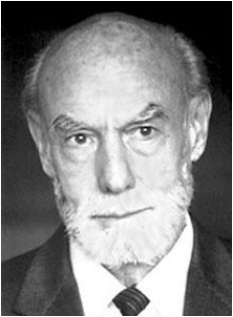
Francis helped create The Wakeman Prize, an award that gave $10,000 to a leading researcher in neuro-regeneration every two years. Four recipients who won the prize also won the Nobel Prize. One of them was Dr. Roger Sperry, a zoologist who won the 1982 Nobel Prize for his research about how the right and left sides of the brain work.
“I called him and said, ‘Dr. Sperry, I'm so glad you won…' But, in his early work as a researcher, he contracted a virus from monkeys, and he had something called runaway response. He told me that he couldn't go because he couldn't walk across the stage to receive the prize. So, I said, ‘Dr. Sperry, if I can arrange it for you just to stand up and sit down, can you do that?' He said, ‘Yes, please.'"
“So, my secretary at the time said, ‘Well, what are you going to do, Mr. Morrissey, call the King of Sweden?' I said, ‘Yes.' So, I called the head of the Nobel Foundation and said, ‘Baron Ramsey, can you help us? Dr. Sperry has a condition. Do you think you could ask the King to walk across and give him the prize?' He said, ‘Sure.'"
“It was so beautiful when the King walked across and put the prize on Sperry."
In the spring of 2016, Francis was at the Berlin Philharmonic. The man beside him was a physicist from California. “We were listening to Beethoven, and he said, ‘Isn't it interesting? The theme starts over here at the percussion, moves next to the strings, then to the percussion on the right, and finally resolves by the horns.' I said, ‘It is fascinating. I talked to Roger Sperry who studied the left and the right side of the brain. He studied harmony at the close of his life.' And the physicist said to me, ‘I know Dr. Sperry. I built monkey cages for him when I was a kid.'"
“I called him and said, ‘Dr. Sperry, I'm so glad you won…' But, in his early work as a researcher, he contracted a virus from monkeys, and he had something called runaway response. He told me that he couldn't go because he couldn't walk across the stage to receive the prize. So, I said, ‘Dr. Sperry, if I can arrange it for you just to stand up and sit down, can you do that?' He said, ‘Yes, please.'"
“So, my secretary at the time said, ‘Well, what are you going to do, Mr. Morrissey, call the King of Sweden?' I said, ‘Yes.' So, I called the head of the Nobel Foundation and said, ‘Baron Ramsey, can you help us? Dr. Sperry has a condition. Do you think you could ask the King to walk across and give him the prize?' He said, ‘Sure.'"
“It was so beautiful when the King walked across and put the prize on Sperry."
In the spring of 2016, Francis was at the Berlin Philharmonic. The man beside him was a physicist from California. “We were listening to Beethoven, and he said, ‘Isn't it interesting? The theme starts over here at the percussion, moves next to the strings, then to the percussion on the right, and finally resolves by the horns.' I said, ‘It is fascinating. I talked to Roger Sperry who studied the left and the right side of the brain. He studied harmony at the close of his life.' And the physicist said to me, ‘I know Dr. Sperry. I built monkey cages for him when I was a kid.'"
Winthrop Gardiner Jr. and Sonja Henie
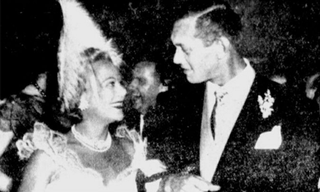
Francis worked in an office where his colleague, Peter Berg, was taking care of the investments and Francis took care of hiring lawyers and handling fiduciary matters for prominent families.
In 1949, Sonja Henie, an Olympic figure skater and film star, married Winthrop Gardiner Jr., owner of Gardiners Island on Long Island. During an event on Gardiners Island with Sonja Henie and Howard Hughes, the stadium collapsed. Gardiner's trustees made him relinquish his claim to Gardiners Island to protect his assets from lawsuits.
Francis remembers meeting one of the lawyers. Gardiner was furious. He charged into the office and said he wanted a divorce from "that Norwegian broad." The lawyer charged $75 for the divorce.
In 1949, Sonja Henie, an Olympic figure skater and film star, married Winthrop Gardiner Jr., owner of Gardiners Island on Long Island. During an event on Gardiners Island with Sonja Henie and Howard Hughes, the stadium collapsed. Gardiner's trustees made him relinquish his claim to Gardiners Island to protect his assets from lawsuits.
Francis remembers meeting one of the lawyers. Gardiner was furious. He charged into the office and said he wanted a divorce from "that Norwegian broad." The lawyer charged $75 for the divorce.
Viktor Frankl
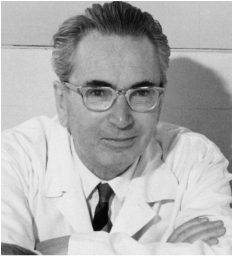
In later years, Francis represented Alexandra Alder, Alfred Adler's daughter. Alfred studied with Sigmund Freud and was a member of Freud's Vienna Psychoanalytic Society.
Initially, Freud and Adler collaborated in the development of psychoanalytic theory, but the relationship became strained, and they parted ways after eight years. Adler believed Freud's preoccupation with sexuality reduced human nature to a single motivating factor. Although Freud was a pivotal force in Adler's development, Adler sought to replace Freud's excessive focus on sexual motivation with his concept emphasizing the human need for community and ability to create positive social change and impact.
“I helped Alexandra through a lot of jams. She's a very strong-minded woman. She came to the United States at the invitation of Harvard for her work as a neurologist. Harvard thought her name was Alexandre and that she was a man, which was not the case."
Francis met Alexandra through some of the Holocaust survivors he represented in the seventies.
“I read Viktor Frankl and his theory of Logotherapy, the search for the meaning of life. And I've always wanted to meet him. So Alexandra ‘Aly' asked me, ‘What can I give you for a fee?' (I didn't charge her). And I said, ‘I'd like to meet Viktor Frankl.' She organized a lunch for me, herself, Fritz Adler, her brother Fritz, and Viktor Frankl."
Francis remembers the lunch as if it were yesterday. It took place at Aly's apartment on Park Avenue where she served them pomegranates, peanut butter, and sardines.
Viktor Frankl had just traveled with his wife by Concorde from London to New York. Francis said, “What did you do when you broke the sound barrier?" And he said, “I kissed my wife."
“He was as nice as you'd expect him to be. And very simple, even though Fritz Adler wanted to talk about psychoses and neuroses, and Aly wasn't interested. She was more impressed that he kissed his wife."
“That meeting relates back to what I was saying about the role of suffering. In Frankl's Logotherapy, those people who survived the concentration camps were the ones who tried to find meaning in their life, even if they couldn't find it. They're the ones who survived."
Initially, Freud and Adler collaborated in the development of psychoanalytic theory, but the relationship became strained, and they parted ways after eight years. Adler believed Freud's preoccupation with sexuality reduced human nature to a single motivating factor. Although Freud was a pivotal force in Adler's development, Adler sought to replace Freud's excessive focus on sexual motivation with his concept emphasizing the human need for community and ability to create positive social change and impact.
“I helped Alexandra through a lot of jams. She's a very strong-minded woman. She came to the United States at the invitation of Harvard for her work as a neurologist. Harvard thought her name was Alexandre and that she was a man, which was not the case."
Francis met Alexandra through some of the Holocaust survivors he represented in the seventies.
“I read Viktor Frankl and his theory of Logotherapy, the search for the meaning of life. And I've always wanted to meet him. So Alexandra ‘Aly' asked me, ‘What can I give you for a fee?' (I didn't charge her). And I said, ‘I'd like to meet Viktor Frankl.' She organized a lunch for me, herself, Fritz Adler, her brother Fritz, and Viktor Frankl."
Francis remembers the lunch as if it were yesterday. It took place at Aly's apartment on Park Avenue where she served them pomegranates, peanut butter, and sardines.
Viktor Frankl had just traveled with his wife by Concorde from London to New York. Francis said, “What did you do when you broke the sound barrier?" And he said, “I kissed my wife."
“He was as nice as you'd expect him to be. And very simple, even though Fritz Adler wanted to talk about psychoses and neuroses, and Aly wasn't interested. She was more impressed that he kissed his wife."
“That meeting relates back to what I was saying about the role of suffering. In Frankl's Logotherapy, those people who survived the concentration camps were the ones who tried to find meaning in their life, even if they couldn't find it. They're the ones who survived."
Bill Gates

Francis left the firm Cadwalader, Wickersham, and Taft in 1975 to begin working at an office that the Deere Trust had created to manage their investments and trust. At that time, Bill Gates, who was about to leave Harvard, came to Francis's office seeking legal advice after Francis's brother had introduced them.
“I had Bill in my office for a couple of days. I wanted the investment team to meet him, but, they didn't want to meet some dropout from Harvard.”
“I told Bill that if he was planning to leave Harvard, which I felt was a mistake, he should read more Shakespeare. Now, that might sound stupid, but had he read more Shakespeare, he might've realized that personalities differ drastically from one another, thus helping him handle Congress better. In my opinion, Microsoft never recovered from the antitrust suit because Bill didn't read Shakespeare.”
“I had Bill in my office for a couple of days. I wanted the investment team to meet him, but, they didn't want to meet some dropout from Harvard.”
“I told Bill that if he was planning to leave Harvard, which I felt was a mistake, he should read more Shakespeare. Now, that might sound stupid, but had he read more Shakespeare, he might've realized that personalities differ drastically from one another, thus helping him handle Congress better. In my opinion, Microsoft never recovered from the antitrust suit because Bill didn't read Shakespeare.”
Marlene Dietrich
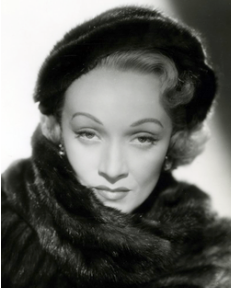
Elisabeth von Knapisch, who became Francis's client, was living in Germany at the beginning of World War II. She wanted to fall in love with and marry someone in France who was a Catholic diplomat.
“But when French officials had denied her Aryan status, she came to the United States. My friends Hilda Huston and Claude Huston had sponsored her. There was this little group who all helped each other - Marlene Dietrich was a part of it."
“Elisabeth owned a clothing shop in New York. Once, when Clare Boothe Luce, ambassador to Italy and wife of Henry Luce, Time Magazine owner, came to the shop to return a suit that Elisabeth had made, the woman working at the store called Hilda. Hilda called Marlene. And Marlene showed up and said, ‘Oh, that looks so beautiful on you.' That's just how it worked then."
“But when French officials had denied her Aryan status, she came to the United States. My friends Hilda Huston and Claude Huston had sponsored her. There was this little group who all helped each other - Marlene Dietrich was a part of it."
“Elisabeth owned a clothing shop in New York. Once, when Clare Boothe Luce, ambassador to Italy and wife of Henry Luce, Time Magazine owner, came to the shop to return a suit that Elisabeth had made, the woman working at the store called Hilda. Hilda called Marlene. And Marlene showed up and said, ‘Oh, that looks so beautiful on you.' That's just how it worked then."
Paige Morris and Jay Lovestone
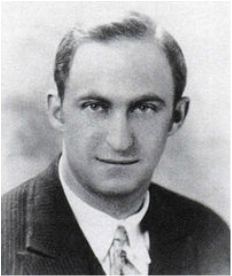
In the 1960s, during the time when Francis's father was a trustee at New England Baptist Hospital, Mohamed Boussaid, the Minister of Economy and Finance in Morocco was gravely injured in a car accident. President Kennedy called Francis's father and asked: “Can we save him?"
“My dad flew in a team of doctors, picked up Minister Boussaid and flew him to Boston for treatment at New England Baptist. While Minister Boussaid was being treated, members of his family flew over, and my mother took care of them when they were here."
During the stay, Madam Lagazuoi introduced Francis and his family to Paige Morris, one of the greatest spies of the ‘40s and ‘50s. She was one of 4,000 women who made great contributions to the OSS (Office of Strategic Services) during World War II. Those women held jobs in research and analysis and OSS General William Donovan called them “invisible apron strings.”
As a spy, Paige worked in Morocco, Saudi Arabia, Yemen, and other exotic places. She was close friends with Jay Lovestone, who had co-founded the American Communist Party in the 1920s after becoming disaffected with the Soviets under Stalin. Lovestone became a U.S. labor organizer and a staunch anti-communist who became an informant for the CIA working with James Jesus Angleton, who was chief of the CIA's counterintelligence office for 20 years starting in 1954.
Paige had a very solid place in the CIA. They called her “Amia,” which in Saudi Arabia means ‘she only bows to God.'
“I said once, ‘Paige, how did you avoid getting raped?' She said, ‘That was easy. I always slept with the Koran on my chest.'”
“Paige saw me as someone she could trust and hired me as her lawyer and adviser. So, in the late '70s, she dragged Jay Lovestone into my office and said, ‘Here, you have to take care of his man.'”
When Lovestone saw Stalin begin to kill millions of Russians, he called him ‘Comrade Murderer' and he denounced the gulag. Lovestone escaped Russia by dressing as a priest and going from convent to convent. He was always an hour away from Stalin getting him.
After the Great Purge of 1937-1938 led to dissatisfaction with the Soviet Union, Lovestone's splinter group - the Lovestoneites - dropped the word "Communist" from their name before their dissolution in 1941. The Communist Party kicked out Lovestone. He evolved into a staunch anti-communist, serving Angleton and Paige Morris in the early years of the CIA.
“When Lovestone denounced Stalin, a lot of leftists of the United States said that he was a crazy nut. They thought there was no such thing as a Gulag and that Stalin was a great man. They thought Lovestone was a traitor. At that time, he was terrified.”
“Lovestone became an anti-Communist, but he died with a love for Lenin. These Communists were hysterical. They never lost their feeling for Lenin. Lovestone told me that Lenin didn't want Stalin to take over. He thought Stalin was too brutal. He thought Trotsky was too weak, so he wanted Bukharin to take his place, but obviously that didn't happen.”
“After getting kicked out of the Communist Party, Lovestone became head of the International Trade Union and the AFL-CIO. He brought all the German trade union members out in Berlin to meet Kennedy. It was a great moment in history for Kennedy.”
“When I met Jay, he was in his eighties and in terrible shape physically. I remember they were giving him Haldol, an antipsychotic drug that is used to treat disorders like schizophrenia. It looked like he was going crazy, but he wasn't. Paige was taking care of him in an apartment on Park Avenue. Some people tried to come and take Lovestone away in a straitjacket. When Paige found out, she demanded they leave. Then, she brought him to me. The day he came into my care, I convinced him to drop Haldol. I gave him 24-hour care.”
“I served as his adviser and trustee for about ten years until he died in 1990.”
“Jay never married. He had three girlfriends: one in Brazil, one in Canada who was from Israel, and Paige Morris. As his trustee, he'd instructed me that when he died, I was to give each of them a different time to come to the funeral so that the women would never meet each other. It was trustee commissions. And that was set by a standard that everyone adhered to.”
“My dad flew in a team of doctors, picked up Minister Boussaid and flew him to Boston for treatment at New England Baptist. While Minister Boussaid was being treated, members of his family flew over, and my mother took care of them when they were here."
During the stay, Madam Lagazuoi introduced Francis and his family to Paige Morris, one of the greatest spies of the ‘40s and ‘50s. She was one of 4,000 women who made great contributions to the OSS (Office of Strategic Services) during World War II. Those women held jobs in research and analysis and OSS General William Donovan called them “invisible apron strings.”
As a spy, Paige worked in Morocco, Saudi Arabia, Yemen, and other exotic places. She was close friends with Jay Lovestone, who had co-founded the American Communist Party in the 1920s after becoming disaffected with the Soviets under Stalin. Lovestone became a U.S. labor organizer and a staunch anti-communist who became an informant for the CIA working with James Jesus Angleton, who was chief of the CIA's counterintelligence office for 20 years starting in 1954.
Paige had a very solid place in the CIA. They called her “Amia,” which in Saudi Arabia means ‘she only bows to God.'
“I said once, ‘Paige, how did you avoid getting raped?' She said, ‘That was easy. I always slept with the Koran on my chest.'”
“Paige saw me as someone she could trust and hired me as her lawyer and adviser. So, in the late '70s, she dragged Jay Lovestone into my office and said, ‘Here, you have to take care of his man.'”
When Lovestone saw Stalin begin to kill millions of Russians, he called him ‘Comrade Murderer' and he denounced the gulag. Lovestone escaped Russia by dressing as a priest and going from convent to convent. He was always an hour away from Stalin getting him.
After the Great Purge of 1937-1938 led to dissatisfaction with the Soviet Union, Lovestone's splinter group - the Lovestoneites - dropped the word "Communist" from their name before their dissolution in 1941. The Communist Party kicked out Lovestone. He evolved into a staunch anti-communist, serving Angleton and Paige Morris in the early years of the CIA.
“When Lovestone denounced Stalin, a lot of leftists of the United States said that he was a crazy nut. They thought there was no such thing as a Gulag and that Stalin was a great man. They thought Lovestone was a traitor. At that time, he was terrified.”
“Lovestone became an anti-Communist, but he died with a love for Lenin. These Communists were hysterical. They never lost their feeling for Lenin. Lovestone told me that Lenin didn't want Stalin to take over. He thought Stalin was too brutal. He thought Trotsky was too weak, so he wanted Bukharin to take his place, but obviously that didn't happen.”
“After getting kicked out of the Communist Party, Lovestone became head of the International Trade Union and the AFL-CIO. He brought all the German trade union members out in Berlin to meet Kennedy. It was a great moment in history for Kennedy.”
“When I met Jay, he was in his eighties and in terrible shape physically. I remember they were giving him Haldol, an antipsychotic drug that is used to treat disorders like schizophrenia. It looked like he was going crazy, but he wasn't. Paige was taking care of him in an apartment on Park Avenue. Some people tried to come and take Lovestone away in a straitjacket. When Paige found out, she demanded they leave. Then, she brought him to me. The day he came into my care, I convinced him to drop Haldol. I gave him 24-hour care.”
“I served as his adviser and trustee for about ten years until he died in 1990.”
“Jay never married. He had three girlfriends: one in Brazil, one in Canada who was from Israel, and Paige Morris. As his trustee, he'd instructed me that when he died, I was to give each of them a different time to come to the funeral so that the women would never meet each other. It was trustee commissions. And that was set by a standard that everyone adhered to.”
Nancy “Trink" Deere Wiman Wakeman Gardiner
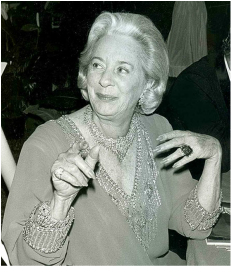
In the early fifties, Nancy "Trink" Deere Wiman Wakeman Gardiner, great-granddaughter of John Deere, shot her husband in their South End Palm Beach mansion.
Nancy made headlines again when she shot her second husband William Wakeman Jr. in the back with a .22 caliber revolver, which left him partially paralyzed. She claimed she shot him during a domestic quarrel after he assaulted her. A judge sentenced her to six years of probation and 20 hours a week of charitable work.
William would not testify against her. He died during a 1969 operation to restore his ability to walk. She contributed millions for neurological research.
“There were some different lawsuits. Luckily, I managed them very well. There were some civil suits, too. The judge had dismissed Nancy's criminal lawsuit, but the civil suits were ongoing. So, I went to see Dianne Feinstein's first husband, Jack Berman, who died in 2002, in San Francisco."
“He was famous for representing women who killed their husbands or lovers. He was quite old by the time I saw him, but I'll never forget one thing he said: ‘You know, the broads - there's one thing I don't understand about them.' I said, ‘What's that?' He said, ‘Can you shoot a gun?' I said, ‘Well, no, I don't deal with pistols.' He said, ‘Yeah, it's very hard. These broads pick up the gun, aim for the heart or the balls, shoot once, and they never miss. And that's because in their minds they've killed the guy over and over again and - because most of these women are abused mentally - they actually want to kill the guy. And when the opportunity arises, bang, they do it.'"
Nancy made headlines again when she shot her second husband William Wakeman Jr. in the back with a .22 caliber revolver, which left him partially paralyzed. She claimed she shot him during a domestic quarrel after he assaulted her. A judge sentenced her to six years of probation and 20 hours a week of charitable work.
William would not testify against her. He died during a 1969 operation to restore his ability to walk. She contributed millions for neurological research.
“There were some different lawsuits. Luckily, I managed them very well. There were some civil suits, too. The judge had dismissed Nancy's criminal lawsuit, but the civil suits were ongoing. So, I went to see Dianne Feinstein's first husband, Jack Berman, who died in 2002, in San Francisco."
“He was famous for representing women who killed their husbands or lovers. He was quite old by the time I saw him, but I'll never forget one thing he said: ‘You know, the broads - there's one thing I don't understand about them.' I said, ‘What's that?' He said, ‘Can you shoot a gun?' I said, ‘Well, no, I don't deal with pistols.' He said, ‘Yeah, it's very hard. These broads pick up the gun, aim for the heart or the balls, shoot once, and they never miss. And that's because in their minds they've killed the guy over and over again and - because most of these women are abused mentally - they actually want to kill the guy. And when the opportunity arises, bang, they do it.'"
